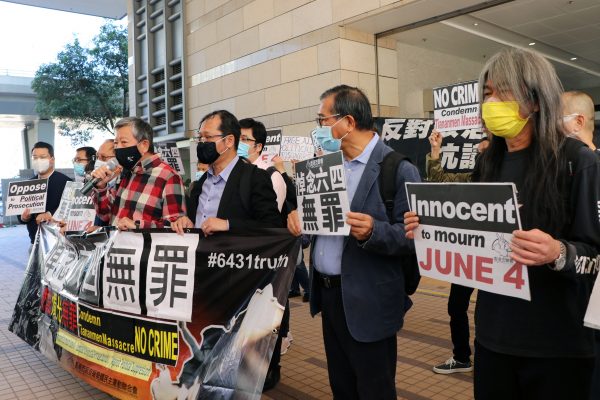Hong Kong’s pro-democracy movement pre-dates the region’s 1997 handover and has chalked up some wins over the years. But its broader objectives have remained unmet as Beijing has taken a different view on the ‘gradual and orderly’ progress to democracy referenced in Hong Kong’s constitutional document, the Basic Law.
Beijing’s reluctance to let go of the reins spawned the 2014 Umbrella Movement, the peaceful mass occupation of Hong Kong streets that likewise failed to bring about democracy but kicked off an ongoing period of political contestation. Hongkongers’ appetite for protest appeared to dim after that movement dispersed, but many young protesters redirected their energy toward electoral politics and a number won election to the regional legislature on pro-democracy and ‘localist’ platforms.
In early 2019, when the Hong Kong government proposed a new law which threatened to break down the ‘firewall’ between the legal systems of Hong Kong and China by facilitating extradition to the mainland, protests broke out once again — with over a million marching in a single day. The anti-extradition law protests lasted the best part of a year and evolved to become less about the proposed law — which was eventually abandoned — and more about the uncompromising stances and violent tactics adopted by both sides.
The protests received popular endorsement via a pro-democratic landslide in District Council elections later that year. This surprised Beijing and placed not just the agitators but Hong Kong’s democratic institutions squarely within its crosshairs.
Although the increased use of force by police has drawn attention and criticism, political repression in Hong Kong has generally taken legalistic form in order to maintain a veneer of legitimacy.
Since 2014, the Hong Kong government has screened out election candidates who it claimed to be secessionists and has had other legislators-elect thrown out for botching their oaths of office. When the legislature’s president allowed members to re-take their oaths, the government challenged his decision in the courts, which were compelled to order disqualification after Beijing intervened with new oath-taking rules.
The new rules emanated from the Standing Committee of the National People’s Congress (NPCSC) in the form of an ‘interpretation’ of Hong Kong’s Basic Law. Hong Kong’s courts held themselves to be barred from questioning the interpretation in form or substance.
Prior to this interpretation, overt interventions in Hong Kong’s legal system had been few, but the turmoil of 2019 drained Beijing’s reserves of restraint and the national security law — also promulgated by the NPCSC — was the result. The national security law’s headline provisions include broad offences of secession, subversion of state power and collusion with foreign forces with penalties that range up to life imprisonment.
Mere months later, the NPCSC issued an executive order allowing the Hong Kong government to summarily dismiss legislators it believed to have endangered national security or solicited foreign intervention. As a result, four moderate pro-democracy lawmakers were immediately sacked, which prompted the resignations of 15 more.
These events suggest the use of law and legal forms to disguise the unfettered, arbitrary persecution of democratic political opposition in pursuit of authoritarian ideological orthodoxy.
The 53 recent arrestees had participated in an event convened by pro-democracy parties and civil society groups to select candidates for the upcoming general election with the aim of winning enough seats to veto the budget and force the government to negotiate or its head to resign.
There is nothing in Hong Kong law to prevent any of this. On the contrary, the Basic Law provides for electoral rights (Article 39), foresees that the legislature may block supply (Article 51) and provides for the forced resignation of the head of the government (Article 52).
Nonetheless, organisers were told that their event was ‘illegal’ and the ensuing arrests were justified by reference to Article 22 of the national security law which proscribes subversion of state power. This extraordinary manoeuvre reveals that the authorities in Hong Kong define legality in political terms and sets up a clash between the Basic Law and the national security law.
Beijing’s post-2019 approach to governing Hong Kong suggests that political expedience will take priority over the text of Hong Kong’s mini-constitution. However that outcome is achieved — via the Hong Kong courts’ deference to realpolitik or by another NPCSC intervention — the rule of law will suffer.
Advocates for political reform are operating in an ever-shrinking space as the media is acquired or influenced, academic appointments become politicised and civil society adapts to a vast, vague national security regime.
Under that regime, even moderates who call on Beijing to keep its handover promises of Hong Kong autonomy and self-government have been branded threats to national security and ejected from public life.
The regional government is now largely compliant with Beijing’s wishes, but work remains to ‘harmonise’ the elected councils and the judiciary. There is talk of further reform to water down democrats’ influence, while repeated calls for the judiciary to be ‘patriotic’ and the jarring insistence that Hong Kong, like China, has no separation of powers ring ominous.
Defenders of Hong Kong’s legal system will insist that judicial independence is a prerequisite for the region’s continued wellbeing, but Beijing may reason that modern China has done well enough with its captive courts.
Brendan Clift is a PhD Candidate and teacher at Melbourne Law School, The University of Melbourne.

